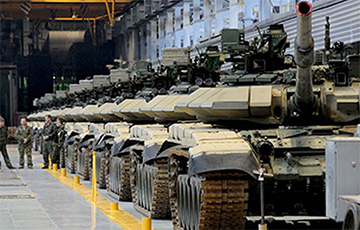Are Russian Weapons As Weak As Iranian Ones?
8- 16.04.2024, 12:32
- 10,322

A Ukrainian military expert explains why half of Iran's missiles did not take off.
On the night of April 13-14, Iran launched more than 300 drones, ballistic and cruise missiles at Israel. At the same time, half of the missiles either did not take off or fell before reaching their targets.
What can be said about the Iranian missile program after the attack on Israel? The website Charter97.org asked this and other questions to Ukrainian military expert, co-director of foreign policy and international security programs at the Razumkov Center in Kyiv, Oleksiy Melnyk:
— I think that one of the reasons could be the general concept of a retaliatory strike. Iran understood that it was advisable not to cause much damage, especially loss of life, to Israel in order to avoid retaliation. It is for this reason that some missiles from old stocks could be used. In my opinion, this is one of the reasons for such a high failure rate. This version has a right to exist.
Secondly, these missiles (even the new model) are probably not that perfect. The probability of their failure is higher than in Western-made missiles. Approximately the same situation is observed with the launch of Russian missiles. From time to time they fall on the territory of the Russian Federation.
I note that one of the reasons why launches are carried out from the airspace of the Caspian Sea is precisely so that failed missiles fall into the water. Including — so that an outside observer does not record cases of failures. This is a typical situation for the Russian Federation.
— Israel and allies shot down 99% of targets launched by Iran. We saw what Western weapons look like when there is real danger. How effective do you think Western air defense would be if the attack were Russian?
— Today this question lies in the theoretical plane. Why did the West and Jordan actively participate in repelling this attack? This is due to minimal risks for Western countries and Jordan regarding some kind of reaction from Iran. This is the first limitation if we consider the possibility of such Western military participation in repelling similar attacks on Ukraine.
Speaking about the fact that today this is more of a theoretical perspective, I think that this issue still needs to be raised. There are, let's say, options that should and can be discussed. In the future, I do not rule out that air defense systems may be used in some regions of Ukraine, such as, for example, the coast of the Black Sea, the Danube, and the western borders of Ukraine with Poland. That is, it cannot be completely ruled out that in the future at some moment we will come to the point where the West will be more actively involved in defense (not saying war) from air attacks.
— We often hear about the “power” of Russian weapons. Could it turn out to be the same product of propaganda as the Iranian one?
— The “no-analogues” meme is already quite often used in relation to the same Kinzhals, about which Putin has repeatedly said publicly that it is impossible to intercept them. But, as we see, it is possible.
Nevertheless, yes, we can be ironic somewhere, but at the same time this is not a reason to ignore the threat of Russian weapons. We especially see this now in the example of gliding bombs, which are quite primitive, but, unfortunately, very deadly.











